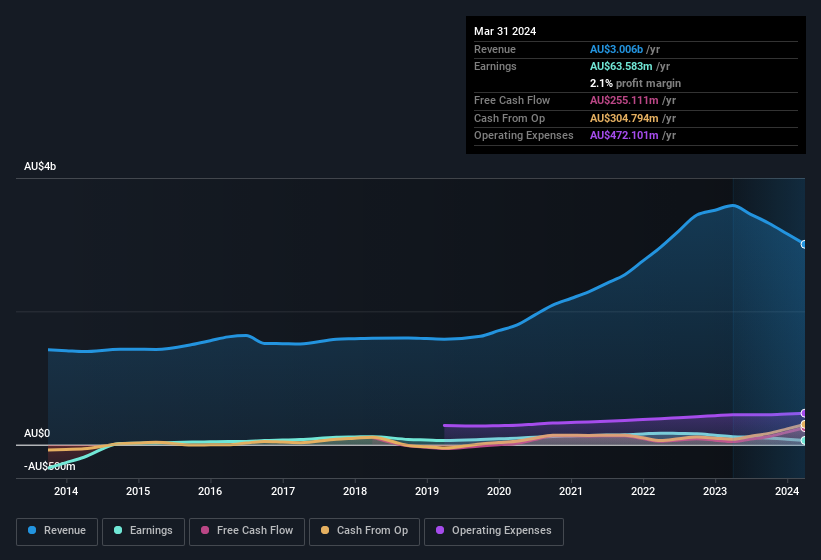There May Be Reason For Hope In Elders' (ASX:ELD) Disappointing Earnings

Soft earnings didn't appear to concern Elders Limited's (ASX:ELD) shareholders over the last week. We think that the softer headline numbers might be getting counterbalanced by some positive underlying factors.
See our latest analysis for Elders

Examining Cashflow Against Elders' Earnings
In high finance, the key ratio used to measure how well a company converts reported profits into free cash flow (FCF) is the accrual ratio (from cashflow). To get the accrual ratio we first subtract FCF from profit for a period, and then divide that number by the average operating assets for the period. The ratio shows us how much a company's profit exceeds its FCF.
As a result, a negative accrual ratio is a positive for the company, and a positive accrual ratio is a negative. While having an accrual ratio above zero is of little concern, we do think it's worth noting when a company has a relatively high accrual ratio. That's because some academic studies have suggested that high accruals ratios tend to lead to lower profit or less profit growth.
Elders has an accrual ratio of -0.16 for the year to March 2024. That implies it has very good cash conversion, and that its earnings in the last year actually significantly understate its free cash flow. Indeed, in the last twelve months it reported free cash flow of AU$255m, well over the AU$63.6m it reported in profit. Elders' free cash flow improved over the last year, which is generally good to see.
That might leave you wondering what analysts are forecasting in terms of future profitability. Luckily, you can click here to see an interactive graph depicting future profitability, based on their estimates.
Our Take On Elders' Profit Performance
Elders' accrual ratio is solid, and indicates strong free cash flow, as we discussed, above. Because of this, we think Elders' earnings potential is at least as good as it seems, and maybe even better! On the other hand, its EPS actually shrunk in the last twelve months. At the end of the day, it's essential to consider more than just the factors above, if you want to understand the company properly. If you'd like to know more about Elders as a business, it's important to be aware of any risks it's facing. While conducting our analysis, we found that Elders has 3 warning signs and it would be unwise to ignore them.
This note has only looked at a single factor that sheds light on the nature of Elders' profit. But there is always more to discover if you are capable of focussing your mind on minutiae. Some people consider a high return on equity to be a good sign of a quality business. So you may wish to see this free collection of companies boasting high return on equity, or this list of stocks with high insider ownership.
Valuation is complex, but we're here to simplify it.
Discover if Elders might be undervalued or overvalued with our detailed analysis, featuring fair value estimates, potential risks, dividends, insider trades, and its financial condition.
Access Free AnalysisHave feedback on this article? Concerned about the content? Get in touch with us directly. Alternatively, email editorial-team (at) simplywallst.com.
This article by Simply Wall St is general in nature. We provide commentary based on historical data and analyst forecasts only using an unbiased methodology and our articles are not intended to be financial advice. It does not constitute a recommendation to buy or sell any stock, and does not take account of your objectives, or your financial situation. We aim to bring you long-term focused analysis driven by fundamental data. Note that our analysis may not factor in the latest price-sensitive company announcements or qualitative material. Simply Wall St has no position in any stocks mentioned.
About ASX:ELD
Elders
Provides agricultural products and services to rural and regional customers primarily in Australia.
Moderate and good value.
Similar Companies
Market Insights
Community Narratives




